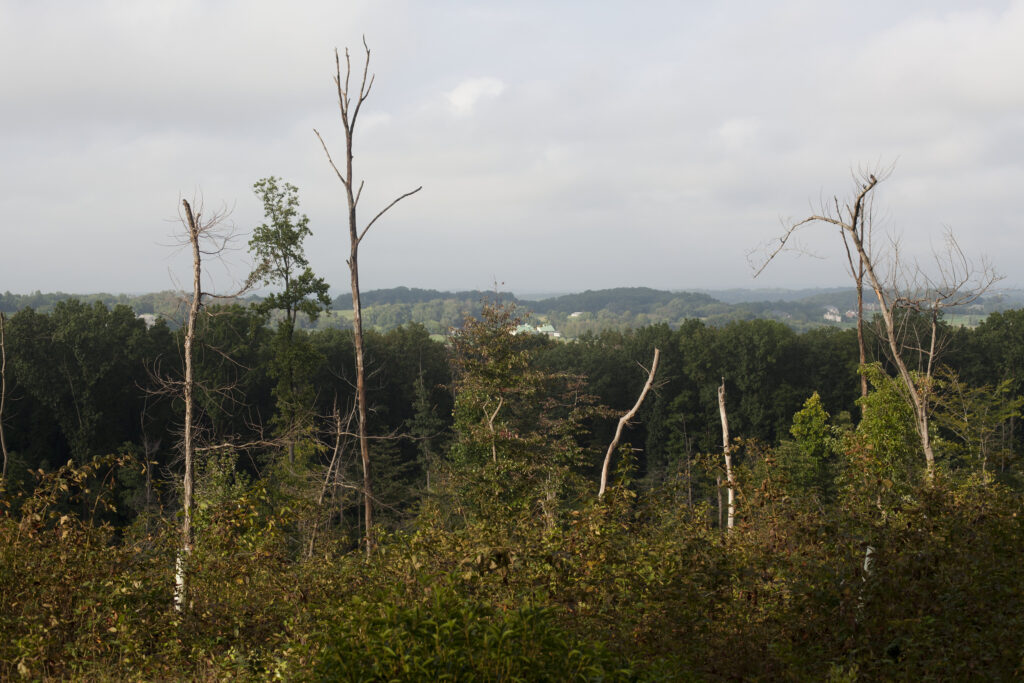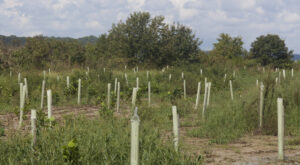This blog post is contributed by the Maryland Department of Natural Resources Forest Service as a case study illustrating one state’s approach to forest carbon markets. NASF supports the development of forest markets that support forest management and keeping forests in forests.
The Family Forest Carbon Program opened for enrollment in Maryland in 2021, but the launch and the success of the program thereafter would not have been possible without the collaborative arm of the Maryland Department of Natural Resources.
Back in 2020, the American Forest Foundation and The Nature Conservancy launched a forest carbon program uniquely designed for small forest landowners. Carbon projects were not a new concept, but they had historically only been created on properties of at least 5,000 acres or more. At that time, less than 1% of U.S. lands in carbon projects involved small ownerships, thus shutting out the vast majority of family forest owners from economic opportunities to support their land.
The Family Forest Carbon Program takes a different approach, empowering family forest owners to address climate change and improve forest resiliency for the future. The program is open to landowners with as little as 30 acres. Enrollees receive annual payments to implement scientific-based forest practices that increase carbon sequestration and storage, as well as improve forest health and wildlife habitat. Landowners are also connected with a professional forester to learn more about long-term sustainable forestry and can have a forest management plan created specific to their land and goals. Contracts are for 20 years, a much more accessible agreement than the typical 100-year contracts offered before the Program’s launch.
AFF and TNC piloted the Family Forest Carbon Program in Pennsylvania, gaining important insights on process and logistics. But each state operates differently, and the groups knew it was important that the program work alongside important governing bodies as well as meet the needs of landowners and forests specific to each region. When they decided to move into Maryland, they connected with leaders at Maryland’s Department of Natural Resources (DNR) to get feedback and expertise on local landowner needs and receptivity to participating in the emerging carbon market.

The team at Maryland DNR had extensive insight into landowners’ experiences across the state, including their diverse goals for their forests, from timber production to wildlife to recreation. To support its landowners, Maryland has a robust Forest Stewardship Program, with many of the private landowners in the state enrolled. Landowners are supported in writing a forest management plan and can take a sizable current use tax deduction for their working forestland.
Even with the Forest Stewardship Program, landowners across the state still struggle with the costs associated with maintaining and improving their forestland. Declining markets have impacted forestry in the state. From 2005 to 2015, the economic impact of forestry in Maryland declined from $4.7 billion to $3.5 billion. The State Forest Action Plan, created by the Maryland DNR in 2020, highlighted a need to invest in new markets which could provide income to landowners for sustainable forest management.
Leaders in DNR, including State Forester Kenneth Jolly, decided it was important to bring this opportunity to landowners. “Maryland is a very densely populated state, and one of our primary goals is to maintain our 2.4 million acres of forestland for the many ecological, economic and social benefits they provide,” Jolly said. “We see the Family Forest Carbon Program as an outstanding partnership to retain Maryland’s forests by providing a positive economic incentive to landowners that encourages them to enhance carbon storage through managing their forestland sustainably.”
Maryland DNR decided to form a partnership with AFF and TNC that would bring the Family Forest Carbon Program to landowners and work seamlessly with the state’s existing efforts on landowner engagement.
To implement the program, the following actions were taken:
- Maryland DNR and AFF signed a memorandum of understanding to define roles and responsibilities. The program would remain owned and implemented by AFF and TNC, but Maryland DNR would act as a liaison to the landowners, using Maryland service foresters to distribute information on the program, and enroll and onboard participants.
- AFF conducted training with Maryland’s service foresters, giving detailed information on the requirements for enrollment and how the program and payments operate. Much of the information needed for enrollment was already captured in Maryland’s forest management plans, which would eliminate the need for additional visits.
- Maryland service foresters were given log-ins to the Family Forest Carbon Program online portal to enroll landowners directly.
- On the Maryland DNR’s side, thanks to the Forest Stewardship Program, a forest management plan template already existed. The plan was high-quality and compatible with the management plan requirements for enrolling in federal and state cost-share options as well as programs such as the American Tree Farm Program. The Department worked with AFF to make a minor adjustment to the plan template to make it compatible with the Family Forest Carbon Program enrollment requirements as well, simplifying the process for landowners.

The Program’s launch in Maryland received an enthusiastic response from family forest owners and other conservation and forestry stakeholders in the state. Landowners who already had a designated service forester were able to keep working with that professional to enroll. Even some additional, non-engaged landowners learned of the Family Forest Carbon Program and reached out. Those landowners were assigned a Maryland service forester, bringing more landowners under the Maryland Stewardship Program umbrella as well.
Maryland Regional Forester George Eberling says the implementation of the program thus far has been going well: “Some landowners have broad goals, others specific. But they all on some level need help to defray costs if they want to take on improvement projects. It’s been good to provide them with an option that supports both stewardship and helps the landowners meet their personal goals.”
The Family Forest Carbon Program is open for enrollment to landowners in Maryland, Massachusetts, Michigan, Minnesota, New York, Pennsylvania, Vermont, West Virginia and Wisconsin. In most states, the program supports landowners through a combination of AFF staff foresters and consulting foresters. Maryland’s unique implementation prioritizes whats best for the landowner and as well as state to ensure success.
If you are interested in the Family Forest Carbon Program here are ways to learn more:
- Landowners: find information about enrollment.
- Foresters: find information on how to become an FFCP-approved forester.
- Partners/conservation organizations/landowner groups: find information about partnerships.

